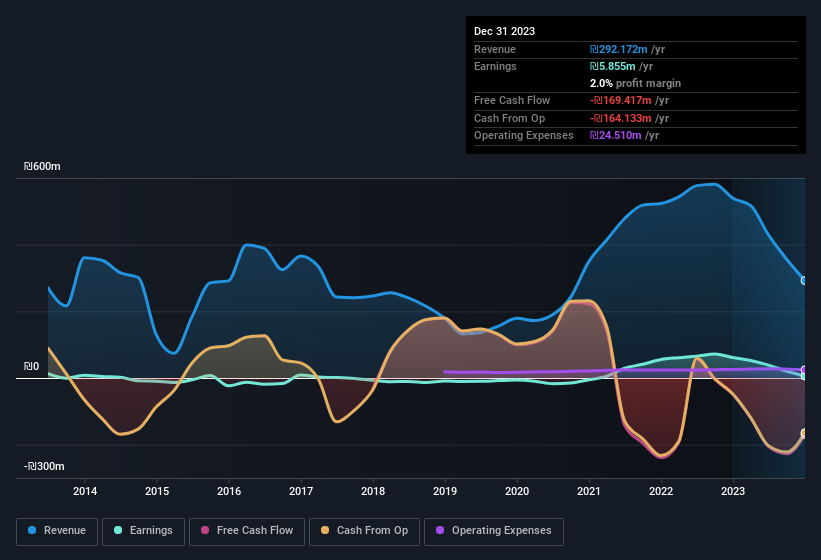Stock Analysis
- Israel
- /
- Real Estate
- /
- TASE:BOTI
Bonei Hatichon Civil Engineering & Infrastructures' (TLV:BOTI) Shareholders Have More To Worry About Than Only Soft Earnings

Bonei Hatichon Civil Engineering & Infrastructures Ltd.'s (TLV:BOTI) recent weak earnings report didn't cause a big stock movement. We think that investors are worried about some weaknesses underlying the earnings.
See our latest analysis for Bonei Hatichon Civil Engineering & Infrastructures

Examining Cashflow Against Bonei Hatichon Civil Engineering & Infrastructures' Earnings
In high finance, the key ratio used to measure how well a company converts reported profits into free cash flow (FCF) is the accrual ratio (from cashflow). To get the accrual ratio we first subtract FCF from profit for a period, and then divide that number by the average operating assets for the period. This ratio tells us how much of a company's profit is not backed by free cashflow.
Therefore, it's actually considered a good thing when a company has a negative accrual ratio, but a bad thing if its accrual ratio is positive. While it's not a problem to have a positive accrual ratio, indicating a certain level of non-cash profits, a high accrual ratio is arguably a bad thing, because it indicates paper profits are not matched by cash flow. That's because some academic studies have suggested that high accruals ratios tend to lead to lower profit or less profit growth.
For the year to December 2023, Bonei Hatichon Civil Engineering & Infrastructures had an accrual ratio of 0.29. Unfortunately, that means its free cash flow was a lot less than its statutory profit, which makes us doubt the utility of profit as a guide. Even though it reported a profit of ₪5.86m, a look at free cash flow indicates it actually burnt through ₪169m in the last year. Coming off the back of negative free cash flow last year, we imagine some shareholders might wonder if its cash burn of ₪169m, this year, indicates high risk. Importantly, we note an unusual tax situation, which we discuss below, has impacted the accruals ratio. This would certainly have contributed to the weak cash conversion.
Note: we always recommend investors check balance sheet strength. Click here to be taken to our balance sheet analysis of Bonei Hatichon Civil Engineering & Infrastructures.
An Unusual Tax Situation
Moving on from the accrual ratio, we note that Bonei Hatichon Civil Engineering & Infrastructures profited from a tax benefit which contributed ₪2.9m to profit. This is of course a bit out of the ordinary, given it is more common for companies to be paying tax than receiving tax benefits! We're sure the company was pleased with its tax benefit. However, the devil in the detail is that these kind of benefits only impact in the year they are booked, and are often one-off in nature. In the likely event the tax benefit is not repeated, we'd expect to see its statutory profit levels drop, at least in the absence of strong growth. So while we think it's great to receive a tax benefit, it does tend to imply an increased risk that the statutory profit overstates the sustainable earnings power of the business.
Our Take On Bonei Hatichon Civil Engineering & Infrastructures' Profit Performance
Bonei Hatichon Civil Engineering & Infrastructures' accrual ratio indicates weak cashflow relative to earnings, which perhaps arises in part from the tax benefit it received this year. On top of that, the unsustainable nature of tax benefits mean that there's a chance profit may be lower next year, certainly in the absence of strong growth. For the reasons mentioned above, we think that a perfunctory glance at Bonei Hatichon Civil Engineering & Infrastructures' statutory profits might make it look better than it really is on an underlying level. So while earnings quality is important, it's equally important to consider the risks facing Bonei Hatichon Civil Engineering & Infrastructures at this point in time. To that end, you should learn about the 3 warning signs we've spotted with Bonei Hatichon Civil Engineering & Infrastructures (including 2 which are significant).
In this article we've looked at a number of factors that can impair the utility of profit numbers, and we've come away cautious. But there are plenty of other ways to inform your opinion of a company. Some people consider a high return on equity to be a good sign of a quality business. While it might take a little research on your behalf, you may find this free collection of companies boasting high return on equity, or this list of stocks that insiders are buying to be useful.
Valuation is complex, but we're helping make it simple.
Find out whether Bonei Hatichon Civil Engineering & Infrastructures is potentially over or undervalued by checking out our comprehensive analysis, which includes fair value estimates, risks and warnings, dividends, insider transactions and financial health.
View the Free AnalysisHave feedback on this article? Concerned about the content? Get in touch with us directly. Alternatively, email editorial-team (at) simplywallst.com.
This article by Simply Wall St is general in nature. We provide commentary based on historical data and analyst forecasts only using an unbiased methodology and our articles are not intended to be financial advice. It does not constitute a recommendation to buy or sell any stock, and does not take account of your objectives, or your financial situation. We aim to bring you long-term focused analysis driven by fundamental data. Note that our analysis may not factor in the latest price-sensitive company announcements or qualitative material. Simply Wall St has no position in any stocks mentioned.
About TASE:BOTI
Bonei Hatichon Civil Engineering & Infrastructures
Bonei Hatichon Civil Engineering & Infrastructures Ltd.
Mediocre balance sheet with poor track record.

